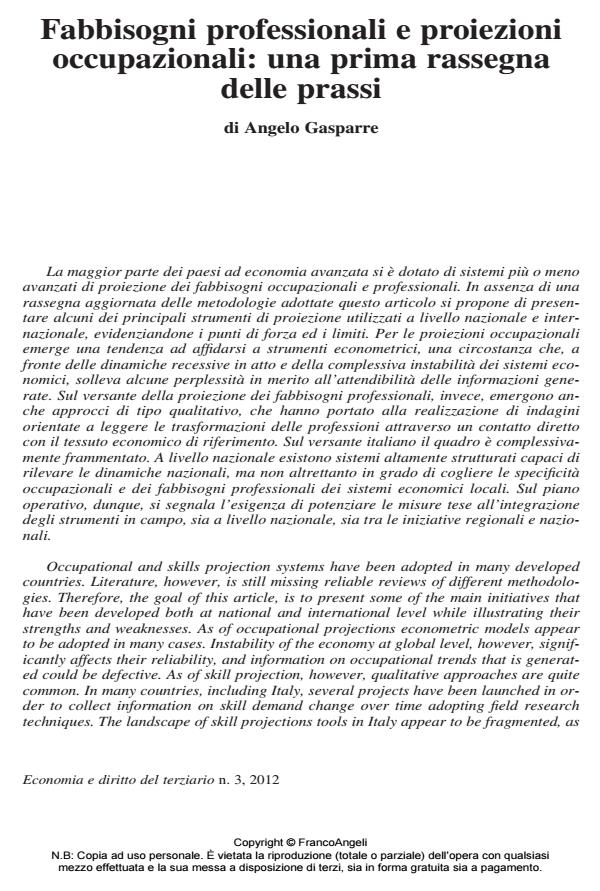Fabbisogni professionali e proiezioni occupazionali: una prima rassegna delle prassi
Journal title ECONOMIA E DIRITTO DEL TERZIARIO
Author/s Angelo Gasparre
Publishing Year 2013 Issue 2012/3 Language Italian
Pages 23 P. 449-471 File size 511 KB
DOI 10.3280/ED2012-003007
DOI is like a bar code for intellectual property: to have more infomation
click here
Below, you can see the article first page
If you want to buy this article in PDF format, you can do it, following the instructions to buy download credits

FrancoAngeli is member of Publishers International Linking Association, Inc (PILA), a not-for-profit association which run the CrossRef service enabling links to and from online scholarly content.
Occupational and skills projection systems have been adopted in many developed countries. Literature, however, is still missing reliable reviews of different methodologies. Therefore, the goal of this article, is to present some of the main initiatives that have been developed both at national and international level while illustrating their strengths and weaknesses. As of occupational projections econometric models appear to be adopted in many cases. Instability of the economy at global level, however, significantly affects their reliability, and information on occupational trends that is generated could be defective. As of skill projection, however, qualitative approaches are quite common. In many countries, including Italy, several projects have been launched in order to collect information on skill demand change over time adopting field research techniques. The landscape of skill projections tools in Italy appear to be fragmented, as many initiatives have been set up both at national and local level but a lack of integration is evident. At the national level structured systems exist and provide useful information on occupational and skill trends for policy making at different levels. A goal to be reached, however, entails either horizontal coordination, among national tools, and vertical coordination, among local initiatives and national systems.
- Acemoglu, D. e Autor D., Skill, Tasks and Technologies: Implications for Employment and Earnings, in «NBER Working Papers» n. 16082, 2010
- Archambault, R., New COPS Occupational Projection Methodology http://www23.hrsdc. gc.ca/l.3bd.2t.1ils@-eng.jsp, 1999
- Bartsch, K.J., The employment projections for 2008-18, «Monthly Labour Review», November, 2009
- Bls, Bureau of Labor Statistics Handbook of Mehods: Chapter 13, Employment Projections, BLS.gov., 2011a
- Bls, Projections methodology, BLS.gov., 2011b
- Carnevale, A.P., Smith, N. e Strohl, J., Help Wanted. Projections of Jobs and Educational Requirements Through 2018, Washington, Center on Education and the Workforce, Georgetown University, 2010a
- Carnevale, A.P., Smith, N. e Strohl, J., Technical Summary to «Help Wanted». Projections of Jobs and Educational Requirements Through 2018, Washington, Center on Education and the Workforce, Georgetown University, 2010b
- Cedefop, Future Skill Needs in Europe. Medium-Term Forecast Synthesis Report, Cedefop, 2008
- Cedefop, Future Skill Supply in Europe. Medium-Term Forecast Up to 2020 Synthesis Report, Cedefop, 2009b.
- Cedefop, Skills for Europe’s future: anticipating occupational skill needs, Cedefop, 2009a
- Excelsior, I programmi occupazionali delle imprese rilevati da Unioncamere, in «Excelsior Informa», Unioncamere – Ministero del Lavoro, Sistema informativo Excelsior, 2011
- Gatti, M., Mereu, M.G, Bergamante, F., Franceschetti, M. e Sesti E., L’analisi dei fabbisogni nella progammazione FSE 2000-2006: stato di attuazione al termine del primo triennio, Roma, Isfol, 2007.
- Hrsdc, Looking-Ahead: A 10-Year Outlook for the Canadian Labour Market (2008- 2017), Human Resource and Skills Development Canada, 2008
- Isfol, Rapporto Isfol 2008, Roma, Isfol, 2008.
- Isfol, Rapporto Isfol 2012. Le competenze per l’occupazione e la crescita, Roma, Isfol, 2012
- Pianta, M., Innovazione e occupazione, http://works.bepress.com /mario_pianta/32, 2011.
- Supino, S., Innovazione, qualifiche, salari: una rassegna critica, in «Quaderni di ricerca sull’artigianato» http://works.bepress.com /stefanosupino/2, 2010
- Violante, G.L., Skill-Biased Technical Change, in The New Palgrave Dictionary of Economics, a cura di Durlauf, S., Blume, L., 2nd Edition
Angelo Gasparre, Fabbisogni professionali e proiezioni occupazionali: una prima rassegna delle prassi in "ECONOMIA E DIRITTO DEL TERZIARIO " 3/2012, pp 449-471, DOI: 10.3280/ED2012-003007